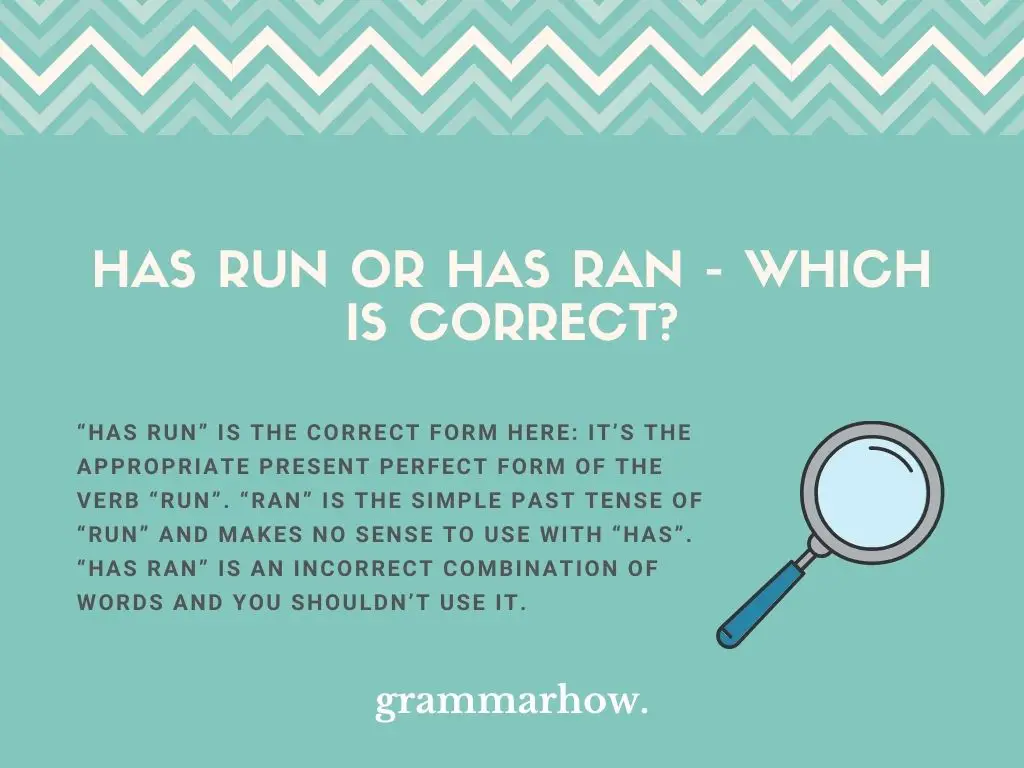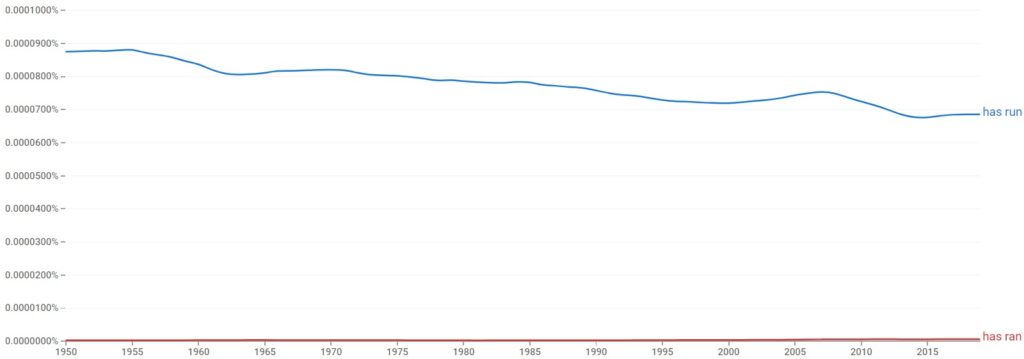“Run” is a word with many meanings. When using in the past tense, should we say “Has Run” or “Has Ran”?
We understand how some verbal constructions are difficult, so we want to know: which is the correct form? Which one should we avoid? And what’s the explanation for it?
Has Run or Has Ran – Which Is Correct?
“Has Run” is the correct form here: it’s the appropriate present perfect form of the verb “Run”. “Ran” is the simple past tense of “Run” and makes no sense to use with “Has”. “Has Ran” is an incorrect combination of words and you shouldn’t use it.

Take a look at the examples below:
- The manager told us store has run out of snacks.
- The manager told us store has ran out of snacks. (incorrect)
- Hannah ran to the store to buy more snacks.
- Hannah run to the store to buy more snacks. (incorrect)
The two sets of examples present completely different scenarios. The first set of sentences show “Has Run” and “Has Ran” in use. “Has Ran” is incorrect and clearly doesn’t work well with the sentence – “Has Run” is the correct form.
The second set of examples shows “Ran” as it should be used: the simple past tense of “Run”. In this case, “Run” doesn’t work for two reasons: “Run” isn’t a past tense of the verb, and in the third person, to indicate a present action, it’d be “Runs” and not “Run”.
Has Run
“Has Run” is the correct present perfect form of “Run”. You can use it to indicate an action in the past.
Take a look at some examples of “Has Run” in sentences:
- Their dog has run away, and we’ve been looking for it.
- Our time has run out. We should just go.
- They have run marathons before.
- I’m glad the sickness has finally run its course.
- I have run out of milk and bread, so I’ll stop by the grocery store.
- The funds on the program have run out, and we stopped accepting new applications.
Has Ran
“Has Ran” is an incorrect form for “Has Run”. It can be a simple misspelling or an intentional mistake due to a lack of knowledge of how the verb “Run” functions. Either way, “Has Ran” shouldn’t be used because it’s not an acceptable form.
Take a look at some examples of “Has Ran” being incorrectly used, followed by a corrected version of the same sentence:
- They have ran to the supermarket to buy ice cream. (incorrect)
- They have run to the supermarket to buy ice cream.
- Sadly, her cat has ran away and we can’t seem to find it. (incorrect)
- Sadly, her cat has run away and we can’t seem to find it.
- I have ran out of rice. (incorrect)
- I have run out of rice.
- The program has ran its course, and we’re ready for the next challenge. (incorrect)
- The program has run its course, and we’re ready for the next challenge.
Which Is Used the Most?
Frequently, when comparing correct and incorrect forms, it’s possible to guess which one will appear more often.
We remain curious, though: which one of those forms is used more often, “Has Ran” or “Has Run”? Let’s take a look at the graph from Google Ngram Viewer below, to find out.

“Has Ran” appears at the bottom of the graph and seems to be barely used. However, we must point out that the fact that some people might use the incorrect phrase doesn’t make it correct. “Has Ran” is an incorrect form of the verb “Run” and should be avoided.
On the other hand, ss expected, “Has Run” appears much more frequently and seems to be the prevalent form. We always thought this would be the case, simply because “Has run” is the correct form for the present perfect of the verb “Run”.
Final Thoughts
Verb tenses can sometimes be confusing. However, when we find out a form is wrong, we should disregard it and forget about it. That’s the case with “Has Ran”: it’s incorrect and we shouldn’t use it. The correct present perfect form of “Run” is “Has Run”.

Martin holds a Master’s degree in Finance and International Business. He has six years of experience in professional communication with clients, executives, and colleagues. Furthermore, he has teaching experience from Aarhus University. Martin has been featured as an expert in communication and teaching on Forbes and Shopify. Read more about Martin here.
